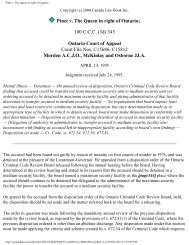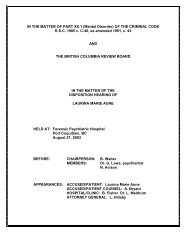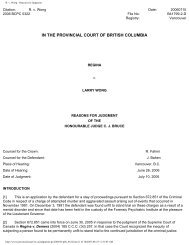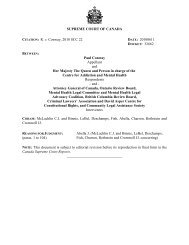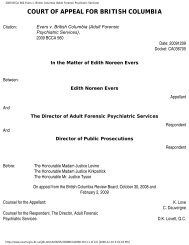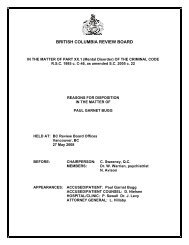R. v. Cuerrier - British Columbia Review Board
R. v. Cuerrier - British Columbia Review Board
R. v. Cuerrier - British Columbia Review Board
Create successful ePaper yourself
Turn your PDF publications into a flip-book with our unique Google optimized e-Paper software.
R. v. <strong>Cuerrier</strong><br />
repeal the common law definition of fraud for assault. They divide sharply, however, on what<br />
Parliament intended to put in its place. Cory J. says Parliament intended the definition of commercial<br />
fraud to apply, subject to limitations. L'Heureux-Dubé J., by contrast, says that Parliament intended any<br />
deceit inducing consent to suffice. This divergence illustrates that when judges depart from the rule of<br />
incremental change to the common law, they face not only the charge that they are stepping outside the<br />
proper constitutional role of the courts, but also the practical problem of finding a new principle to put in<br />
place of the existing common law rule. Often the new principle is difficult to find and when found,<br />
proves to be an ill fit. This leads to complex ramifications, both on the theoretical and practical<br />
level. This case is no exception.<br />
46 The commercial concept of fraud endorsed by Cory J. in principle vitiates consent to contact<br />
whenever there is: (1) deception; resulting in, (2) deprivation. The element of deception is satisfied by<br />
the failure to disclose. The element of deprivation is satisfied by exposure to the risk of harm.<br />
47 The problem with this theory is that failure to disclose virtually any known risk of harm would<br />
potentially be capable of vitiating consent to sexual intercourse. The commercial fraud theory of<br />
consent offers no principled rationale for allowing some risks to vitiate consent to sex but excluding<br />
others. For example, pregnancy may be regarded as a deprivation in some circumstances, as may be the<br />
obligation to support a child. It follows that lying about sterility or the effectiveness of birth control may<br />
constitute fraud vitiating consent. To take another example, lies about the prospect of marriage or false<br />
declarations of affection inducing consent, carry the risk of psychological suffering, depression and<br />
other consequences readily characterized as deprivation. The proposed rule thus has the potential to<br />
criminalize a vast array of sexual conduct. Deceptions, small and sometimes large, have from time<br />
immemorial been the by-product of romance and sexual encounters. They often carry the risk of harm<br />
to the deceived party. Thus far in the history of civilization, these deceptions, however sad, have been<br />
left to the domain of song, verse and social censure. Now, if the Crown's theory is accepted, they<br />
become crimes.<br />
48 Cory J., recognizing the overbreadth of the theory upon which he founds his reasons, attempts<br />
to limit it by introducing an ad hoc qualifier: there must be a "significant risk of serious bodily harm"<br />
before consent is vitiated. This limitation, far from solving the problem, introduces new<br />
difficulties. First, it contradicts the general theory that deception coupled with risk of deprivation<br />
suffices to vitiate consent. A new theory is required to explain why some, but not all kinds of fraud,<br />
convert consensual sex into assault. Yet none is offered. Second, it introduces uncertainty. When is a<br />
risk significant enough to qualify conduct as criminal? In whose eyes is "significance" to be determined<br />
- the victim's, the accused's or the judge's? What is the ambit of "serious bodily harm"? Can a bright line<br />
be drawn between psychological harm and bodily harm, when the former may lead to depression, selfdestructive<br />
behaviour and in extreme cases suicide? The criminal law must be certain. If it is uncertain,<br />
it cannot deter inappropriate conduct and loses its raison d'être. Equally serious, it becomes unfair.<br />
People who believe they are acting within the law may find themselves prosecuted, convicted,<br />
imprisoned and branded as criminals. Consequences as serious as these should not turn on the<br />
interpretation of vague terms like "significant" and "serious". Finally, Cory J.'s limitation of the new<br />
crime to significant and serious risk of harm amounts to making an ad hoc choice of where the line<br />
http://ql.quicklaw.com/qltemp/C2KEwCMAFbZMTYcs/00011scr-00019415%2ehtm (20 of 44)2007-08-21 1:18:15 PM



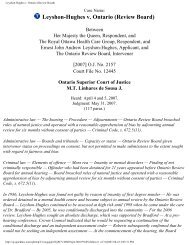
![LaFortune [LaFortunate] (Re) - British Columbia Review Board](https://img.yumpu.com/42779845/1/190x245/lafortune-lafortunate-re-british-columbia-review-board.jpg?quality=85)
